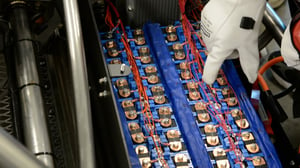
EV Service Training Compliance Requires Add'l Federal Safety Standards
PARTNER SPOTLIGHT
Dealer Management System, Computer Technology, Media/Advertising, Automotive Auction, F & I/Aftermarket Products, Automotive Technology Training & Compliance
 A NHADA Gold PARTNER
A NHADA Gold PARTNERComputer Technology, Automotive Shop Equipment, Environmental Services
 A NHADA Platinum PARTNER
A NHADA Platinum PARTNERF & I/Aftermarket Products, Automotive Technology Training & Compliance, Environmental Services
.png?width=150&name=corp_logo_horz_on_light_with_trademark_symbol_1200w%20(002).png) A NHADA Diamond PARTNER
A NHADA Diamond PARTNERThe bigger challenge rests with independent service repair operations that may have numerous brands of EVs to work on. NFPA 70E requires “Qualified” workers to be trained and have expertise specific to the hazard, and not all EV systems are even remotely the same.
The National Fire Protection Agency (NFPA) produces fire and life safety standards covering a wide array of risk exposure, including electrical safety. NFPA 70E sets safety requirements for any worker exposed to 50 volts or more. Workers exposed to 50 or more volts must be trained to be “Qualified Electrical Workers” according to the Standard.
Qualified workers must be able to demonstrate the ability to test systems, prevent arc flash along with other competencies including implementing OSHA’s Lockout/Tagout Standard (1910.147). NFPA 70E also sets requirements for Personal Protective Equipment while working on electrical equipment and removing someone safely from an electric current.
Current battery systems for electric cars typically have operating voltages of 200-600 volts, and their output current can reach 500A. Battery capacity directly affects the driving mileage of EVs, and also has an impact on charging efficiency & charging time, so we can expect these numbers to climb.
Loss Prevention recommends that when having technicians trained on EV service, ALL members ensure that compliance with NFPA 70E and OSHA’s Lockout/Tagout is part of the program. Furthermore, independent service, collision and towing operations must ensure their technicians are safe across a broad exposure to numerous high-voltage electrical system designs.
NFPA has some free resources available related to EV fires, including free training and emergency response guides for every alternative fuel vehicle.
There is also a paid app that has more details, is interactive, and has other vehicles besides cars, but it is not free.
NHADA member Littleton Chevrolet will be hosting an EV Safety Training for First Responders on January 21, 2022.
NHADA Loss Prevention will continue to provide members with information and resources related to EV service and compliance with electrical safety standards. We are also partnering with companies to provide industry-specific EV Safety Training.
Stay tuned!


















.png?width=150&name=Ally_Final%20Logos%20and%20Pairings_11.14.2018-01%20(2).png)


-2.png?width=150&name=Wipfli%20Logo%20Blue%20RGB%20(1)-2.png)


.jpg?width=150&name=NHADA_Partner_FTR_Img_NHADA_Insurance%20(1).jpg)


.jpg?width=150&name=NHADA_Partner_FTR_Img_JMA(1).jpg)


